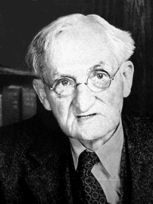Liberty H. Bailey, Jr.
(1858 - 1954)

Liberty Hyde Bailey, Jr. was a world renown plantsman, utilizing his abilities as botanist, taxonomist, horticulturist, and writer. His influence was widespread and was felt as teacher, administrator, lecturer, and world traveler. His prolific writings provided horticultural information not only to botanists, but also to farmers and gardeners.
The Cornell Connection: Bailey accepted a position at Cornell University in 1888, became Dean in 1903 and after securing state funding, established the State College of Agriculture at Cornell.
Liberty H. Bailey, Jr. was born on March 15, 1858 in South Haven, Michigan. He attended Michigan Agricultural College, graduating in 1882. After working at Harvard under Asa Gray and as professor at Michigan Agricultural College, Bailey accepted a position at Cornell University in 1888. There he expanded the botanical and agricultural teaching programs, as well as beginning nature study education by publishing the Cornell Nature-Study Bulletin. Bailey became Dean in 1903 and after securing state funding, established the State College of Agriculture at Cornell. He created new departments, an experiment station, an arboretum, and many new courses of study.
After resigning as Dean in 1913, Liberty was able to travel more and collect plant specimens worldwide. His trips took him to such places as China, New Zealand, Jamaica, and Brazil, to name just a few. Accumulating a vast number of palm specimens, he soon became a world authority on the study of palms. Collecting so many new plants increased the size of his personal herbarium to over 140,000 specimens. Finally in 1935, Bailey donated all his collections (herbarium, library, and seed catalogue collection) to Cornell University, thereby establishing a new department called the L. H. Bailey Hortorium. He remained the director of the department until his resignation in 1951.
During his career at Cornell University, L. H. Bailey continued to write and produce timely agricultural and horticultural works. Some of the most notable are the Standard Cyclopedia of Horticulture and the Manual of Cultivated Plants. Later came Hortus and Hortus Second. He began work on a revision to be called Hortus Third but died (at the age of 96) before it could be completed. Hortus Third was later published by the Bailey Hortorium and still remains in use today.
For further information, please consult the extensive biography of L. H. Bailey that was written by Harlan Banks in 1994.
